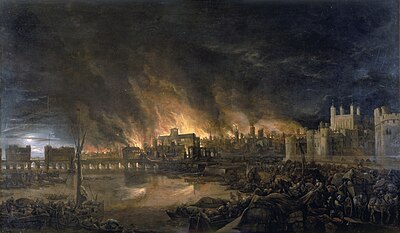This day in history: The Great Fire of London began on this day in 1666 in Pudding Lane and 80% of London was destroyed.
In 1667 strict new fire regulations were imposed in London to reduce the risk of future fire and allow any fire that did occur to be more easily extinguished. The fire resulted in the emergence of the first insurance companies, starting with Nicholas Barbon's Fire Office. These companies hired private firemen and offered incentives for clients who took measures to prevent fires—for example, a cheaper rate for brick versus wooden buildings. Confusion between parish and private firefighting efforts led the insurance companies in 1832 to form a combined firefighting unit which would eventually become the London Fire Brigade. The fire led to a focus in building codes on restricting the spread of fire between units.
The Great Plague epidemic of 1665 is believed to have killed a sixth of London's inhabitants, or 80,000 people, and it is sometimes suggested that the fire saved lives in the long run by burning down so much unsanitary housing with their rats and their fleas which transmitted the plague, as plague epidemics did not recur in London after the fire. During the Bombay plague epidemic two centuries later, this belief led to the burning of tenements as an antiplague measure. The suggestion that the fire prevented further outbreaks is disputed; the Museum of London identifies this as a common myth about the fire.
This Kindle book, 70 Forgotten Ghost Stories is now available on Amazon by clicking here...and it is only 99 cents and Edgar Allan Poe - An Exhumation is available on Amazon by clicking here...and it is only 99 cents




No comments:
Post a Comment